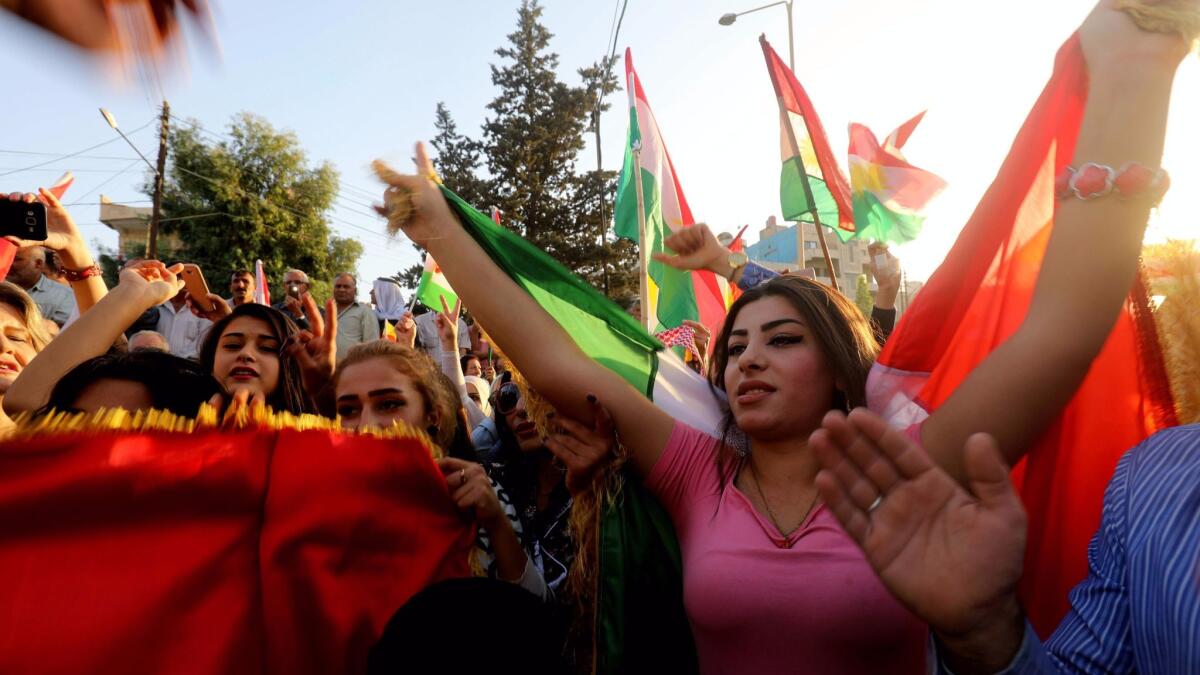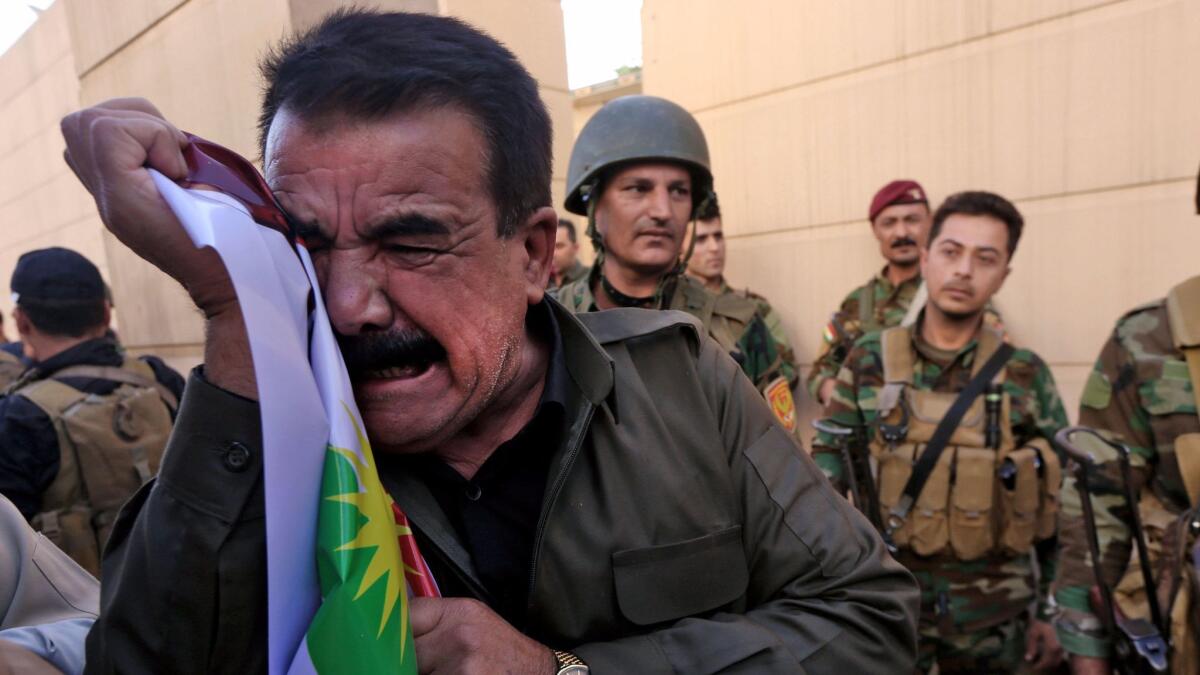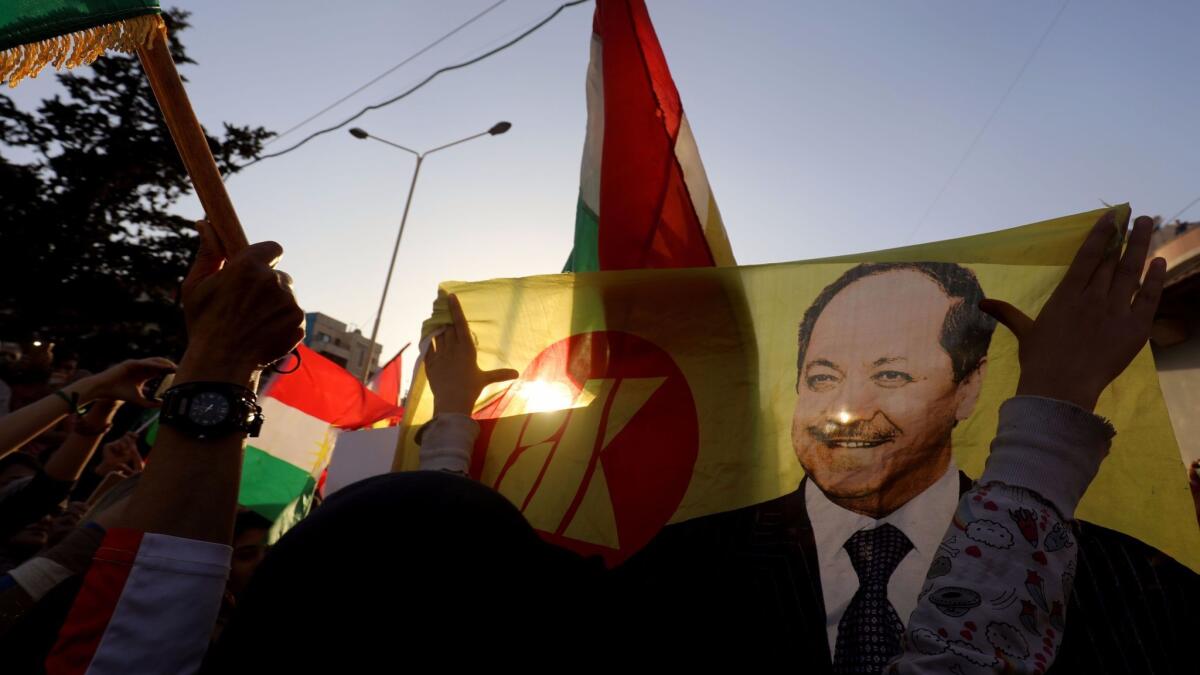Iraq’s Kurds see their hopes for independence turn into a fight for survival

- Share via
Reporting from Irbil, Iraq — Before this month, it would have been hard to imagine a better moment in the almost century-long struggle for Iraqi Kurds to get their own state.
Over the last three years, they had become a vital U.S. ally in the fight against Islamic State. The semiautonomous enclave they had carved out of Iraq appeared to be the rare success in a region where Washington’s policies are not often held in high regard. As a bonus, they had the upper hand in areas still in dispute with Baghdad, including Kirkuk, the multiethnic city Kurds see as their Jerusalem and which they had captured while battling Islamic State in 2014.
So when Kurdish leader Massoud Barzani pushed ahead with an independence referendum in September, he expected a reluctant but amicable sendoff from Baghdad with the West’s blessing. What he got has been a desperate fight to preserve gains won over decades of bloodshed.

Over the last week, the Kurds have watched their one-time allies in Iraq’s armed forces take back at least 8,900 square miles of land — an area roughly the size of New Jersey. The seized territory has long been in dispute between Baghdad and the leadership of the Kurdish region.
A particularly galling defeat was in Kirkuk, where the peshmerga, the Kurds’ fighting force, were forced to retreat after members of the Talabani family, who head the Kurds’ main opposition party, forged a deal with Baghdad, with the backing of Iran. Barzani was enraged and accused them of treachery.
The losses so far are staggering: airports, power plants, vital infrastructure and oil reserves making up almost 50% of Kurds’ oil revenues.
“It’s nothing less than a nakba [catastrophe] for the Kurds who wanted statehood,” said Lukman Faily, former Iraqi ambassador to Washington, in a phone interview.
The events have also dealt a powerful blow to Kurdish unity, with the two main Kurdish parties — Barzani’s Kurdish Democratic Party and the opposition Patriotic Union of Kurdistan — trading recriminations over who is to blame for the setbacks that have put the very viability of the semiautonomous Kurdish region in question.
Party-affiliated media channels eagerly pounce on claims of Kurdish residents being harassed at the hands of the Popular Mobilization Forces, Iranian-backed paramilitary groups the Kurds say have engaged in sectarian attacks. Politicians and activists on social media brand their opponents as traitors to the Kurdish cause.
The acrimony between the two parties, said Kamal Chomani, a nonresident fellow at the regional think tank the Tahrir Institute for Middle East Policy, has brought the Kurdish regional government to “the brink of collapse” and delayed the region’s elections, which were scheduled for next month.
It’s a stark contrast to the buoyant days following the Sept. 25 independence referendum, when more than 92% percent of voters favored seceding from Iraq.
“People feel they have been duped,” said Barham Salih, the former prime minister of the Kurdish region’s government.

“Kurds have historically been united in pursuit of independence. The ruling class has squandered this unifying cause through incompetence, corruption and nepotism,” he said.
Many blame Barzani’s intransigence in the face of virtually unanimous international and regional opposition to the referendum, especially from neighbors such as Iran and Turkey with their own restive Kurdish minorities.
Critics accuse him of pushing ahead with the vote to burnish his legacy, extend his grip on power (despite having already exceeded the term limits of his presidency by two years) and move attention away from the economic woes of the Kurdish regional government.
Others, like Emma Sky, a senior fellow at Yale’s Jackson Institute for Global Affairs who served as the governorate coordinator of Kirkuk in 2003, say Barzani’s error was one of overreaching.
“There was nothing new in this referendum compared to past ones,” she said. If Barzani had settled for a Kurdistan without Kirkuk and negotiated a joint administration of that city with Baghdad, “he could have done it.”
“But the chutzpah of including Kirkuk, that was just too much of a provocation.”
Shakhawan Abdullah, a Kurdish member of parliament with Barzani’s party, countered that Baghdad would have rejected the referendum no matter what.
For Sky, the Kirkuk deal was part of the longtime rivalry between Barzani and his opponents in the Patriotic Union of Kurdistan.
“They’ve done this to each other time and time again,” she said. She recalled that in 1996, Barzani invited then Iraqi strongman Saddam Hussein to clear out the Patriotic Union in Irbil.
Patriotic Union officials, however, insist the recent move to clear out of Kirkuk was designed to curb bloodshed.
“Anywhere from 65,000 to 70,000 people had already begun to flee Kirkuk, and we had lost dozens of peshmerga. We wanted to ... avoid a humanitarian catastrophe,” said Ranj Talabani, a Kurdish security official and Patriotic Union member, in a phone interview. He added that Iran’s role had been “greatly overstated.”
Barzani, meanwhile, has gone out of sight amid calls from some quarters that he step down. The Patriotic Union is still reckoning with the fault line within its own ranks.
“Socially, politically, and now even administratively, the Kurdish region is about to be divided into two entities, something which will further divide Kurdish culture,” said Chomani, the think tank fellow. The referendum, he said, may wind up killing the dream of independence.
The winner amid the chaos has been Iraqi Prime Minister Haider Abadi. His strong-arm approach, which many credit with preventing the breakup of the country into sect-based cantons, has been met with approval by many Iraqis and is likely to serve him well in April’s national elections.
His maneuver, said Faily, had brought the relationship between the Kurdish regional government and Baghdad “back to the drawing board.”
But the Kurds have more immediate concerns.
“We were barely able to pay teachers and civil servants a half wage with the oil proceeds we had. If the government has lost all this revenue, how will it pay the salaries?” said Talabani, the Patriotic Union official.
ALSO
Areas freed from Islamic State will test U.S. policy on limiting overseas role
Sour notes as Israeli Prime Minister Netanyahu confronts the ‘pickles’ in parliament
Bulos is a special correspondent.
Twitter: @nabihbulos
More to Read
Sign up for Essential California
The most important California stories and recommendations in your inbox every morning.
You may occasionally receive promotional content from the Los Angeles Times.











